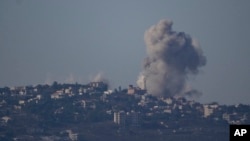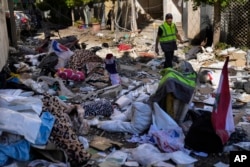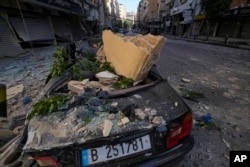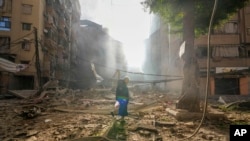The Israeli military on Thursday urgently warned residents of more than 20 southern Lebanese towns and villages to immediately evacuate their homes and move to the north to get out of harm's way as Israel continued its ground campaign against Hezbollah.
On his account on the social media platform X, Israel Defense Forces Arabic spokesman Lieutenant Colonel Avichay Adraee advised residents to move north of the Awali River to "save your lives." He warned any southward movement would put them in danger.
He said that "Hezbollah's activities force the IDF to act against it forcefully," and that the IDF would let them know when it was safe to return home.
The Israeli military's latest warnings increased the number of southern Lebanese towns urged to evacuate to 70.
The IDF released video of what it said were troops operating in southern Lebanon. The army's 6th Brigade is currently in southern Lebanon, "conducting targeted raids to thwart and destroy the terrorist infrastructure of the Hezbollah terrorist organization," it said in a statement.
The IDF also said Thursday that Israeli fighter jets, in a strike Wednesday, killed Hezbollah commander Khader Al-Shahabiya. The statement said Khader was responsible for the July rocket attack that hit a soccer field in Majdal Shams in the Israeli-occupied Golan Heights that killed 12 children.
Early Friday morning, Israel's military ordered residents to evacuate areas around two buildings in Beirut's southern suburbs and to stay at least 500 meters away, CNN reported. The Israeli military warned it would soon target the sites. One area includes the Sainte Therese Hospital. The orders were issued at 12:48 a.m. and 1:27 a.m., local time.
Israel's military said Thursday that it had hit Hezbollah's intelligence headquarters in Beirut. Late that same day, a source close to Hezbollah said Israel had engaged in 11 strikes on the group's south Beirut stronghold, Agence France-Presse reported. The onslaught marked one of the most violent raids since Israel ramped up its campaign last week.
Early Friday, at least one Israeli strike hit outside the perimeter of Beirut's international airport, Reuters reported, citing a source in Lebanon's Ministry of Transport and Public Works.
Lebanon's Health Ministry said Friday that 37 people had been killed in Israeli strikes over the past day. An additional 151 people were injured, the ministry said.
Lebanese health officials said Thursday that an Israeli airstrike hit an apartment building in Beirut, killing at least six people and wounding seven others.
Hezbollah also carried out new attacks. Late Thursday, warning sirens sounded in northern Israel around Haifa Bay and Galilee, and 10 projectiles crossed into Israel from Lebanon, the Israeli military said. Hezbollah also said it targeted Israel's Nesher base in Haifa.
Iran's attack
Tensions have dramatically escalated in the region since late Tuesday, when Iran unleashed an unprecedented barrage of about 200 ballistic missiles aimed at Israel.
Iran conducted the attack on the eve of the Jewish New Year in retaliation for a series of Israeli attacks on its proxies, including the assassinations of Palestinian Hamas leader Ismail Haniyeh in Tehran in July and the head of Lebanese Hezbollah, Hassan Nasrallah, in Beirut last week.
Israeli Prime Minister Benjamin Netanyahu warned that Tehran "will pay" for the attack, and his security cabinet met late Tuesday to discuss possible retaliation. Some reports have suggested Israel may strike at Iran's oil refineries or even its nuclear sites.
Thursday as he left the White House, President Joe Biden was asked if the U.S. would allow Israel to retaliate and what the U.S. plans were in that regard.
Biden said, "First of all, we don't allow Israel, we advise Israel. And there's nothing going to happen today. We'll talk about that later."
Iran's president, Masoud Pezeshkian, said Wednesday that Tehran would have a strong response to any Israeli retaliation.
Speaking during a news conference with the Qatari emir, Sheikh Tamim bin Hamad Al Thani, Pezeshkian said Iran was not in pursuit of war with Israel but cited the airstrike on Tehran during his inauguration that killed Hamas leader Ismail Haniyeh as an Israeli provocation. He said he continued to advocate for peace.
Israel has never officially taken responsibility for the strike that killed Haniyeh.
Israel announced Wednesday the deaths of eight of its soldiers who were killed in fighting with Hezbollah in southern Lebanon, a day after it started what it said was a "limited" ground operation to destroy militant infrastructure there.
Security Council meets
In New York, the U.N. Security Council held an emergency meeting Wednesday to discuss the worsening situation.
"The raging fires in the Middle East are fast becoming an inferno," U.N. Secretary-General Antonio Guterres told the council.
He reiterated his calls for an immediate cease-fire in Gaza, the release of all hostages and a cessation of fighting in Lebanon.
VOA White House Bureau Chief Patsy Widakuswara and VOA reporter Natasha Mozgovaya contributed to this report. Some information came from The Associated Press, Reuters and Agence France-Presse.

















